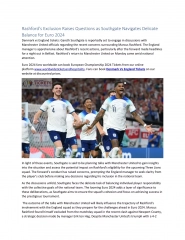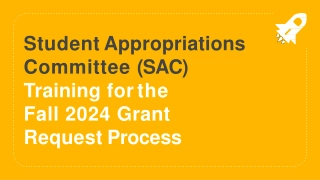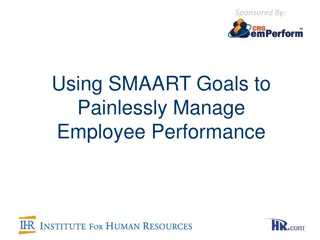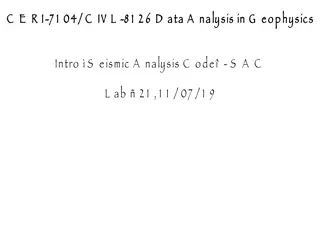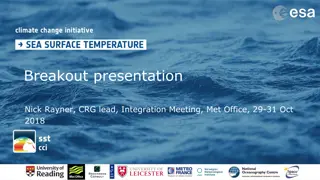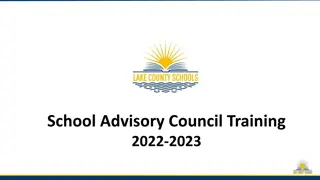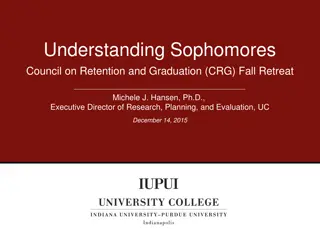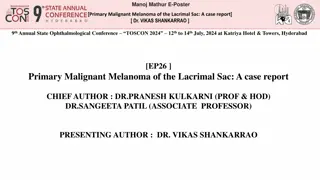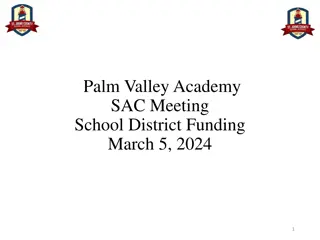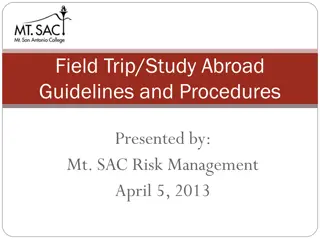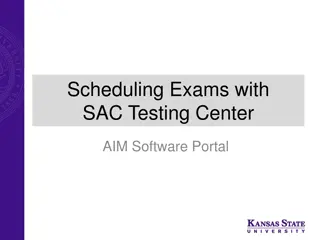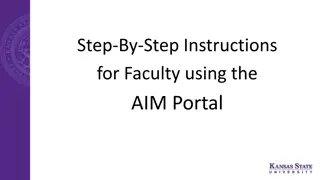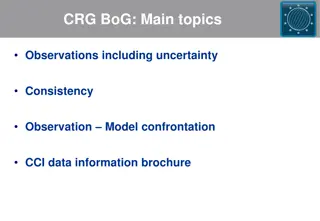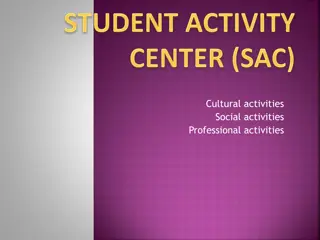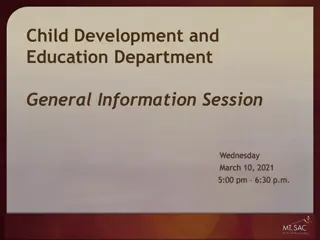
Apply for SAC Clinical Research Grants in Speech-Language Pathology and Audiology
Explore the opportunities provided by Speech-Language & Audiology Canada for SAC members to apply for grants supporting clinical research in speech-language pathology and audiology. Learn about the application process, deadlines, and requirements to enhance research capacity and contribute to the clinical evidence base in Canada.
Download Presentation

Please find below an Image/Link to download the presentation.
The content on the website is provided AS IS for your information and personal use only. It may not be sold, licensed, or shared on other websites without obtaining consent from the author. If you encounter any issues during the download, it is possible that the publisher has removed the file from their server.
You are allowed to download the files provided on this website for personal or commercial use, subject to the condition that they are used lawfully. All files are the property of their respective owners.
The content on the website is provided AS IS for your information and personal use only. It may not be sold, licensed, or shared on other websites without obtaining consent from the author.
E N D
Presentation Transcript
For more information and contacts, go to SAC Clinical Research Grants Clinical Research Grants How to Apply for a Grant volunteer@sac-oac.ca
About SAC Clinical Research Grants SAC has awarded an average of 2 grants per year since its launch in 2007. Each year, SAC awards grants of $5,000 each. The aim is to increase the capacity of clinical researchers in the fields of speech-language pathology and audiology in Canada. Opportunity for SAC clinicians with little to no research experience to contribute to the clinical evidence base. The applications are reviewed by the CRG committee, which is composed of volunteer SAC speech-language pathologists and audiologists of academic and clinical practice backgrounds, with a limited-service term.
Project Opportunities Develop a research team Develop a research proposal Develop research capacity Implementation Science Survey Research Observational Research Quasi-Experiments Randomized Control Trial
S-LP example of a previously awarded study theme: "A National Survey of Canadian Speech-Language Pathologists Working in Schools" Robin Gains, Ph.D Speech-Language Pathologist
Audiology example of previously awarded study theme: "Screening for Vestibular Toxicity for Children Receiving Ototoxic Medications" Vicky Papaioannou, M.Cl.Sc. Audiologist
Submit the Following Documents to Apply 1. Application Form 2. Proposal: clearly stated objective, methodology and appropriate citations 3. Timeline and Budget 4. Evidence of: Feasibility, increased research capacity, clinical application 5. Curriculum Vitae - for each applicant and mentor 6. Letters of Support 7. Cover letter
Take Note of the Deadlines! Speech-Language & Audiology Canada provides clinical research grants to SAC members to conduct research or engage in activities that increase research capacity. The grants are intended to support an increase in the clinical evidence base for the professions of speech-language pathology and audiology in Canada. Up to two grants of $5,000 will be awarded to SAC members who identify the opportunity to increase clinical research capacity. Applications must be received by e-mail: volunteer@sac-oac.ca with the subject line: SAC Clinical Research Grants Committee, by May 31 [of the application year] at midnight EST, to be considered. Only complete applications will be considered. Successful applicants will be notified by the end of July [of the application year].
Take Note of the Deadlines! Speech-Language & Audiology Canada (SAC) provides clinical research grants to SAC members to conduct research or engage in activities that increase research capacity. The grants are intended to support an increase in the clinical evidence base for the professions of speech-language pathology and audiology in Canada. Up to two grants of $5,000 will be awarded to SAC members who identify the opportunity to increase clinical research capacity. Applications must be received by e-mail: volunteer@sac-oac.ca with the subject line: SAC Clinical Research Grants Committee, by May 31 [of the application year] at midnight EST, to be considered. Only complete applications will be considered. Successful applicants will be notified by the end of July [of the application year].
Take Note of the Deadlines! Speech-Language & Audiology Canada provides clinical research grants to SAC members to conduct research or engage in activities that increase research capacity. The grants are intended to support an increase in the clinical evidence base for the professions of speech-language pathology and audiology in Canada. Up to two grants of $5,000 will be awarded to SAC members who identify the opportunity to increase clinical research capacity. Applications must be received by e-mail: volunteer@sac-oac.ca with the subject line: SAC Clinical Research Grants Committee, by May 31 [of the application year] at midnight EST, to be considered. Only complete applications will be considered. Successful applicants will be notified by the end of July [of the application year].
Identifying Information is Collected on the First Page of the Application There are restrictions for a valid Principal Applicant These restrictions do not apply to co- applicants
Practicing S-LP or Audiologist Not Practicing Not providing S-LP or Audiology services in current roles, e.g., not eligible to practice University/College Instructor with clinical credentials, but not practicing as an S-LP or Audiologist Clinical credentials, but works in another field while not practicing S-LP or Audiology Post-Doctoral fellow Doctoral student Master s student Non-thesis student Researcher Providing S-LP or Audiology services or Managing/Supervising S-LPs or Audiologists Practicing Audiologist or Speech-Language Pathologist Also, acceptable as practicing: On parental leave On temporary health leave Part-time clinician and part-time university/college instructor In the process of moving from one employer to another, given approval from the new employer to complete the research
Equivalent Not Equivalent Master s Degree in S- LP or Audiology OR Equivalent Credentials Educational and clinical practice credentials that are accepted under SAC Mutual Recognition Agreements Undergraduate degrees in Communication Sciences and Disorders that are not accepted for SAC membership Education and clinical practice credentials that were ultimately deemed acceptable for SAC membership Credentials to practice as a Communication Health Assistant
Does this count? Supervised Clinical Practicum No One Year of Clinical Experience in Audiology or Speech-Language Pathology CCC year Yes Volunteer Hours No Private Practice Yes Paid Employment Yes
The application requires the name of at least one mentor. The mentor must demonstrate engagement with the project and previous research experience that pertains to the topic. If you do not have a research mentor in mind, SAC can help! Email us for more information: volunteer@sac-oac.ca.
Ethics Approval is Nearly always required (see TCPS-2)
Principal Applicant Mustbe a SAC Member SAC Membership If you are eligible, it is easy to join SAC: Join SAC Non-members of SAC can be Co-Applicants.
Supporting Documents Format 12-point font 1.5 line spacing APA formatting for citations and references
Clearly stated research question/objective with rationale and appropriate citations. Description of the activities to be completed. Appropriate research methodology (e.g. types of data collected, data analyses etc.). Proposal (2-page maximum) Significance of the research for clinical practice. Description of the roles of the principal applicant and co-applicant(s). Identification of any related research funding and how the present funds will provide added value. Disclosure of any conflict of interest.
Title identifies the important variables. Clearly Stated Research Question or Objective First sentence states concisely how chosen research design will answer the question about those variables.
Improve fidelity of emergent literacy intervention with children who have Down syndrome Implementation Science (example) The Active Implementation Framework will be used to develop and provide an on-line training to SL- Ps to increase frequency and improve fidelity of their emergent literacy intervention for children who have Down syndrome.
Cultural adaptation of a home-based shared book reading intervention A quasi-experiment will be used to describe outcomes of a culturally adapted home-based shared book reading intervention for Indigenous families in comparison to outcomes obtained in previous years when implemented in standard form. Quasi-Experiment (example)
Compare follow-up rates for on-line, in- home, and in-clinic screening of older adults hearing. Randomized Control Trial (example) Patient follow-through after screening of hearing, general health, and social outcomes in older adults will be compared in a randomized control trial of different implementations: on-line, in- home by health nurses, and in-clinic by audiologists.
Literature Review must be brief but informative on the following: Provide definitions of important terms History of the literature and research on the topic Most up to date but relevant literature/research on the topic Rationale for your research question Rationale for your choice of research design Rationale for your choice of methods Literature Review: Justification Literature review should also answer questions reviewers might ask themselves as they are reading your proposal: Has this research been done before? What are the likely benefits of doing this research now? Is the field ready for the implementation of the project? The significance of the research for clinical practice must be clear. Remember that the committee members are not experts on your topic.
Need not be numerous but must be appropriate Citations in APA style provide author(s) and date, e.g. Sasisekaran (2014) showed that phonology and stuttering are related ... ... participants will present with inconsistent phonological disorder (Dodd, Holm, Crosbie & McCormack, 2005). References can be formatted for APA style by hand or by using APA reference generators on-line or downloaded for your word processor. There are specific requirements for each type of reference material, e.g., Sasisekaran, J. (2014). Exploring the link between stuttering and phonology: A review and implications for treatment. Seminars in Speech and Language, 32(2), 95-113. Dodd, B., Holm, A., Crosbie, S., & McCormack, P. (2005). Differential diagnosis of phonological disorders. In B. Dodd (Ed.), Differential diagnosis and treatment of children with speech disorder (pp. 71-82). London: Whurr. Citations and References
Who will the research participants be? How will they be recruited? How long will it take to obtain a sufficiently large sample? Participants Activities to be Completed (How will the research question be answered?) Qualitative observations Cross-sectional assessment(s) Parallel groups Randomized groups Research Design How much time is required? How many people are needed to complete the data collection? What tools/instruments are required? What spaces are necessary? Resources
You may need to provide additional details about data collection, analysis, and presentation. Be sure to indicate the roles of each person on your research team. Data Analysis Identify any hardware and software that you have or will acquire to complete your data analysis.
Parallel Groups Comparison Survey Study Numerical study responses will be transferred to spreadsheets by the research assistant and then summed for a total satisfaction score. The mean score by condition (in- clinic, home program) will be compared using a t-test). All participants will complete the survey to assess Swallowing and Energy Related Fatigue after the intervention. Data Analysis Examples Responses will be checked for missing scores and possible mis- scored items. After corrections for standard distributional issues (normality, homoscedasticity), the survey responses will be subjected to ANOVA to compare differences across the control intervention and experimental intervention groups. The written responses to the question please describe your experience overall will be analyzed by the Principal and Co- Applicant for positive and negative experiences regarding convenience, interpersonal issues, therapeutic alliance, therapy techniques, progress, and other factors. Data processing will be conducted by the research assistant with support from the mentor. The Principal Applicant will not be involved in this stage to avoid biasing the results.
Other resources Conflict of Interest Relationship with committee member Another grant Other Relevant Information Relationship with mentor Employer Relationship with donor or other institution Other sources
Timeline Budget Itemize and justify research expenses Include a timeline for completion of the project Timeline and Budget 1 page maximum If you have expenses that will be paid for by other funds, itemize them as well and clearly identify the source of funding Project must be completed within two years If the project is longer, show how a useful part of the project can be completed within two years Ensure that all items to be paid for with SAC research grant funds are eligible research expenses What will be the deliverables in the two-year period? Ineligible expenses must be excluded or attributed to other funds Make a chart or diagram
Written Example of Budget: "The costs of recruiting, treating, and assessing the participants will be borne by the hospital as a normal cost of providing services to these patients. The forms used in this study will be digital. The iPad used to collect data will be provided by our department. The informed consent procedure and the collection of the outcome questionnaires will be completed the research assistant whose salary will be funded by the SAC CRG in the form of a summer work study grant ($5000). Processing of the survey data will also be conducted by the research assistant with supervision from the Principal Applicant and the Mentor. Statistical analysis of the data will be completed at the university in the lab of the Mentor who has the necessary software tools. Ultrasound imaging of the patient s tongue movements before and after intervention will be completed by the Principal Applicant using ultrasound equipment loaned to our department by ABC Therapeutic Instruments. We have no conflicts of interest to declare. ABC Therapeutic Instruments has loaned us the equipment with no constraints on our ability to present or published the research findings."
Table Budget Example #2 Table Budget Example #1
Feasibility 1 page and appendixes Team Mentor Site
Show that each member of the team has the knowledge and experience required to carry out the project. Show that each member of the team is competent to perform the tasks as described in the proposal. Show that each member of the team is positioned to carry out their role as described in the proposal. Show that each member of the team has the time to make the contributions as described in the proposal. Describe how the project will enhance the research capacity of the team members and the clinical site at which the project will be conducted. Describe how the project will increase the clinical evidence base. Attach a curriculum vitae for each applicant. Team
Show that the mentor has the capacity to support the project, e.g., previous relevant and successful research experience. Show that the mentor is engaged with the team and the project. Minimally the mentor should be involved in developing the research design. The mentor may be helpful in the process for obtaining approval from an ethics board. The mentor may be involved in data analysis. Attach a letter of support from the mentor. Additionally include a curriculum vitae with publications for the last five years. Mentor
Demonstrate that the clinical site that will host the research has the capacity to support the project. Consider space, equipment, participants, and personnel Ensure that the site has permitted the time requirement for conducting the research. If resources from another site are included, describe those resources as well. Include a signed letter of support from a manager at the clinical site that confirms the release time for research, access to research participants, and use of necessary resources. Site
Good luck with your application! volunteer@sac-oac.ca This Photo by Unknown Author is licensed under CC BY

